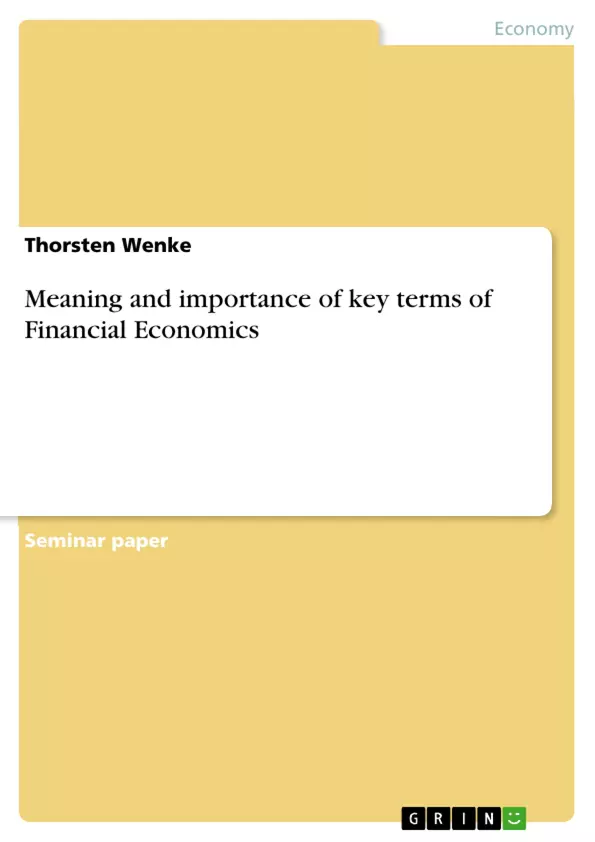In this essay the meaning and importance of several crucial terms from financial economics will be discussed, namely: ‘information asymmetry’,‘agency costs’,‘dividend policy’,‘signalling’ and ‘clientele effects’. Firstly, each one of these concepts will be defined and exemplified for better understanding. After having done this, the connection between these single concepts will be highlighted and shown as to how they may have reciprocal influence. To conclude, a short summary will highlight the implications for public quoted firms and their managers.
Table of Contents
- Meaning and importance of key terms of Financial Economics
- Information asymmetry
- Agency costs
- Dividend policy
- Signalling
- Clientele effects
Objectives and Key Themes
This essay aims to define and discuss the meaning and significance of several key terms in financial economics, specifically 'information asymmetry', 'agency costs', 'dividend policy', 'signalling', and 'clientele effects'. It explores how these terms are interconnected and how they influence each other. Finally, the essay highlights the implications of these concepts for publicly listed companies and their managers.
- Information asymmetry and its impact on market efficiency
- The agency problem and the resulting agency costs
- Dividend policy as a means of communicating information
- The role of signalling and its effect on share prices
- The clientele effect and its implications for dividend policy
Chapter Summaries
- The essay starts by defining 'information asymmetry', highlighting the contrast between neoclassical economics' assumption of complete information and the 'new institutional economics' concept of 'bounded rationality'. The essay emphasizes how this information asymmetry arises from the separation of management and ownership in large companies, giving managers an advantage over shareholders.
- The essay then connects information asymmetry to the 'agency problem' and 'agency costs'. It explains how agency costs arise due to the conflicting objectives of managers and shareholders, and outlines the three types of agency costs: 'bounding costs', 'monitoring costs', and 'residual loss'.
- Moving on, the essay examines the term 'dividend policy', discussing the Miller and Modigliani (MM) model and its 'irrelevancy proposition'. The essay explains that in a perfect market, a company's value and shareholder wealth are independent of its dividend policy. However, it acknowledges the real-world relevance of dividends as a means of conveying information to the market.
- The essay explores the concept of 'signalling' in relation to dividends, highlighting how shareholders interpret unexpected dividend changes as signals about a company's financial prospects. It discusses how dividends act as an alternative channel for managers to communicate information to the market.
- Finally, the essay delves into the 'clientele effect', explaining how companies attract specific investor groups (clienteles) based on their preferred payout ratios. The essay highlights how clientele effects are linked to dividend distribution and how they are particularly relevant in markets with different tax treatments for dividends and capital gains.
Keywords
The essay focuses on key terms and concepts such as information asymmetry, agency costs, dividend policy, signalling, and clientele effects. It explores the interplay between these concepts and their implications for market efficiency, company value, and managerial decision-making.
Frequently Asked Questions
What is information asymmetry in financial economics?
It refers to a situation where managers have more or better information about a company's prospects than the shareholders, often leading to market inefficiencies.
How are agency costs defined?
Agency costs arise from the conflict of interest between managers (agents) and owners (principals) and include monitoring costs, bonding costs, and residual loss.
What does the term 'signalling' mean regarding dividends?
Signalling is the idea that managers use dividend changes to send "signals" to the market about the company's future financial health and stability.
What is the 'clientele effect' in dividend policy?
It suggests that different groups of investors (clienteles) prefer different dividend policies based on their individual tax situations or income needs.
Is dividend policy irrelevant in the real world?
While the Miller-Modigliani model argues it is irrelevant in a perfect market, factors like taxes, signalling, and agency costs make it highly relevant in practice.
- Citation du texte
- Thorsten Wenke (Auteur), 2009, Meaning and importance of key terms of Financial Economics , Munich, GRIN Verlag, https://www.grin.com/document/137221



